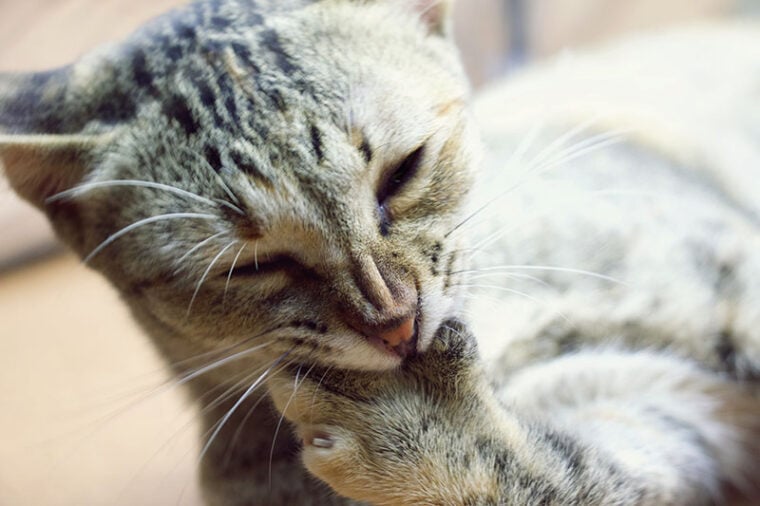
As cat owners, we often notice our feline friends engaging in various grooming behaviors. However, if you’ve noticed your cat biting their feet excessively, you might be concerned about the underlying cause. In this article, we’ll explore the reasons behind this behavior and provide some helpful solutions. Additionally, we’ll answer some frequently asked questions related to cats biting their feet.
However, please do keep in mind that this article is not a replacement for veterinary examination and individual advice. If you have any concerns regarding your cat’s health, consult with a veterinarian.
The 5 Possible Causes of Cats Biting Their Feet
1. Parasites
Fleas, ticks, and mites can cause discomfort and itchiness on your cat’s skin, prompting them to bite and chew at their feet. Regularly checking your cat for parasites and using appropriate vet-approved preventative measures can help keep these pesky critters at bay.
2. Infections
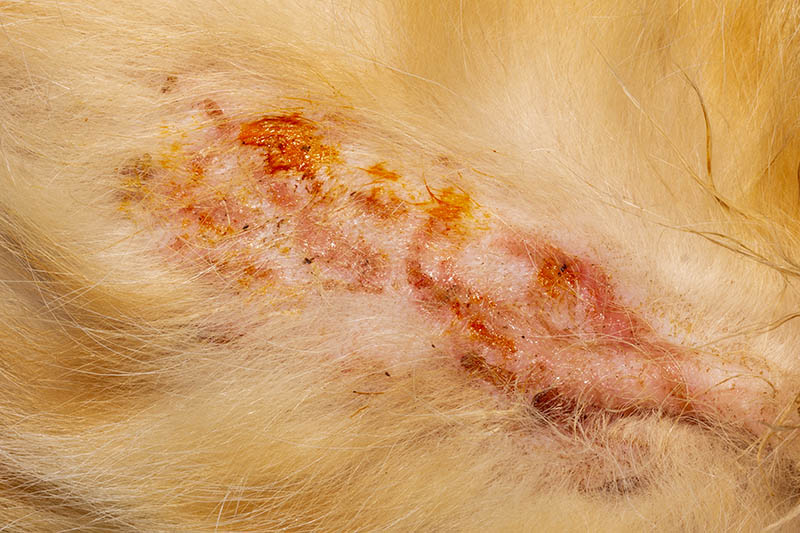
Bacterial or fungal infections, such as yeast infections, can cause itching and discomfort in your cat’s feet. If you suspect an infection, it’s essential to consult your veterinarian for a proper diagnosis and treatment plan.
Sometimes, cats develop a skin infection called an abscess, which usually manifests as a swelling somewhere on the paw or the legs that the cats may try to lick and chew at. This swelling is uncomfortable and often soft and filled by pus, and it is often caused by a cat fight or foreign material stuck under the skin, such as grass seeds. It can burst and leak blood and pus, which is a very unpleasant smelling discharge. Again, this condition requires veterinary attention.
3. Allergies
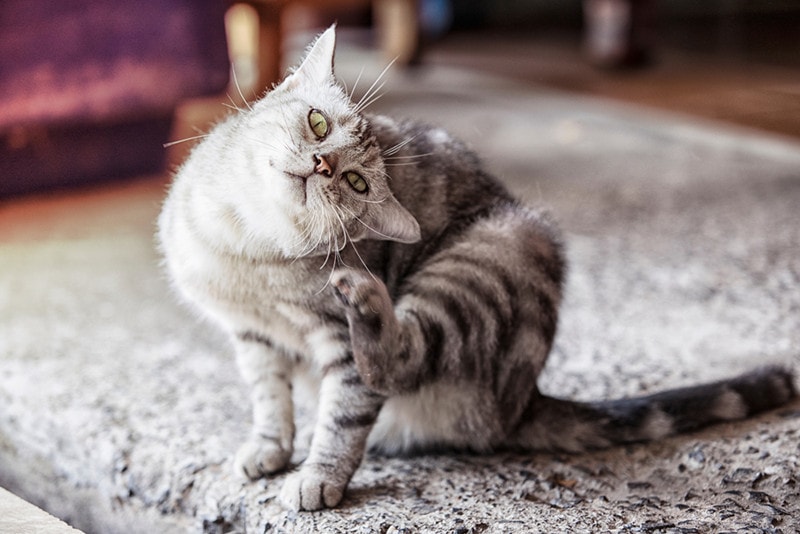
Another reason for cats biting their feet is allergies. Cats can develop allergies to food, environmental factors, or even flea bites. These allergies can cause itchiness and irritation, leading to excessive licking and biting of their feet, alongside other areas on their skin.
4. Pain or Injury
Cats may bite their feet or paws due to pain or injury, such as a cut, sprain, or ingrown nail. If your cat seems to be in pain or you notice any signs of injury, such as swelling, bleeding, or limping, consult your veterinarian for an evaluation and appropriate treatment.
Sometimes, cats can even fracture their toes or other long bones if they get their legs stuck somewhere or suffer from a road traffic accident or an awkward fall. They will usually limpand become quiet and withdrawn, or even aggressive due to the pain, while some may be licking and biting their paws and feet. Pathological fractures due to bone fragility, bone infections, or even cancer are possible.
5. Stress or Anxiety
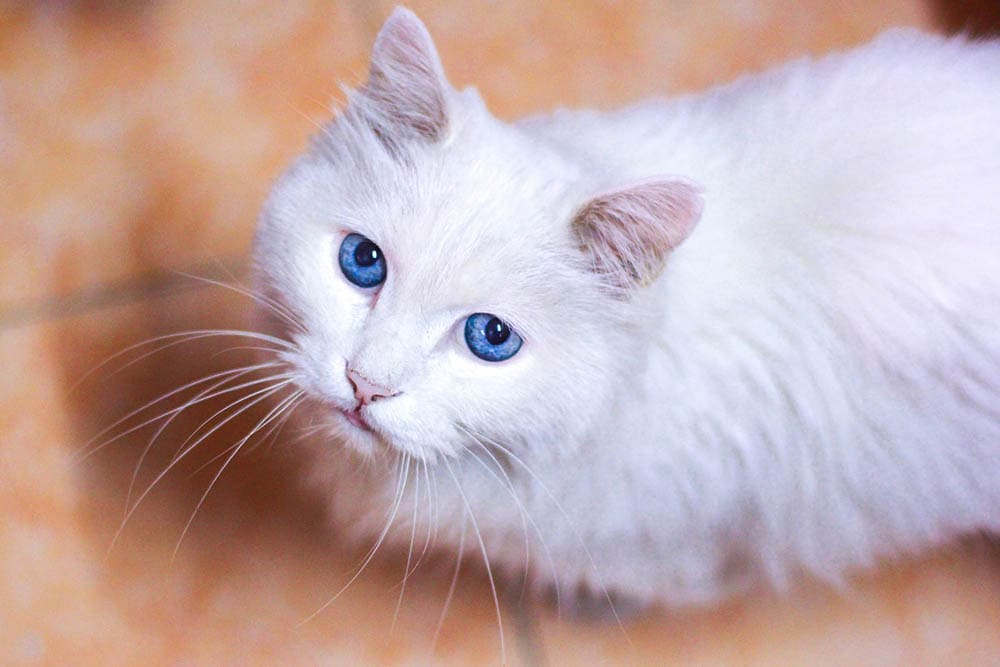
Stress and anxiety can sometimes manifest in excessive grooming behaviors, including biting their feet. Identifying and addressing the source of your cat’s stress can help alleviate this behavior.
This may lead to hair loss and skin irritation, due to excessive licking and chewing, while it’s important to differentiate it from normal grooming behaviors, where no area in particular will be groomed more, and no skin and fur changes will be present.
The 5 Things to Do If You’re Concerned
1. Consult Your Veterinarian
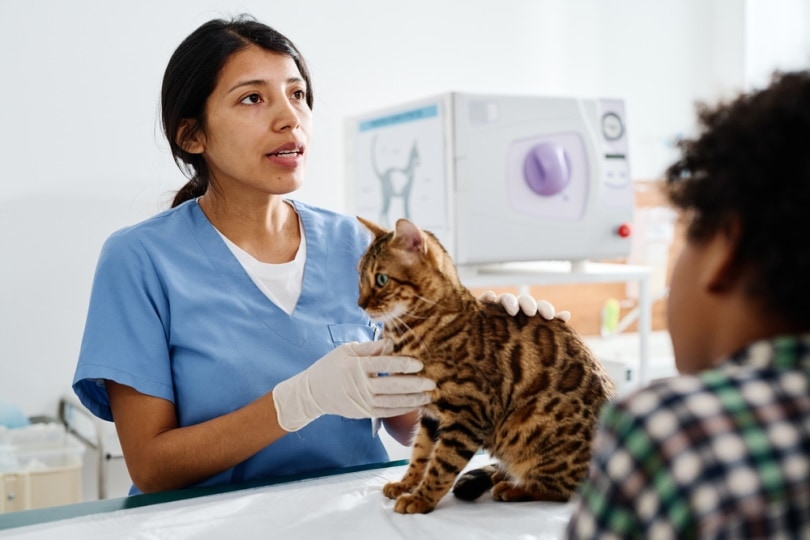
If your cat is excessively biting their feet, it’s crucial to consult your veterinarian to determine the underlying cause and develop a suitable treatment plan. Possible reasons might include allergies, parasites, infections, pain or injury, and stress or anxiety. Your veterinarian can perform a thorough examination and recommend appropriate treatments or interventions based on their findings.
2. Regular Grooming and Nail Trimming
Keeping your cat’s fur and nails well-groomed can help minimize irritation and discomfort related to their feet. Regular grooming can also help you spot any potential issues, such as cuts or infections, early on.
Here are some grooming tips to keep your cat’s feet in good condition:
Keeping your cat's nails trimmed can help you avoid many common paw problems. We like Hepper's Cat Nail Clipper Set because it has it all: two sizes of well-designed clippers, a nail file, and a handy carrying pouch. The clippers have built-in safety guards and locking switches, and the blades are made of sturdy, easy-to-clean stainless steel.
At Pet Keen, we've admired Hepper for many years, and decided to take a controlling ownership interest so that we could benefit from the outstanding designs of this cool cat company!
3. Monitor and Address Changes in Behavior
Keep a close eye on your cat’s behavior, and if you notice any changes or increased foot-biting, consult your veterinarian for guidance. Early intervention can help address the underlying issue and prevent complications. Pay attention to factors that might trigger foot-biting behavior in your cat, such as stress, new environments, or changes in their diet.
4. Provide Environmental Enrichment
Providing toys, scratching posts, and other forms of environmental enrichment can help keep your cat mentally stimulated and reduce stress-related behaviors, such as foot-biting. Ensuring that your cat has ample opportunities for play and exercise can also contribute to their overall well-being.
Consider these tips for creating a stimulating environment for your cat:
Consider providing puzzle feeders or treat-dispensing toys to challenge your cat’s mind and encourage problem-solving skills.
5. Create a Stress-Free Environment
Ensuring that your cat has a comfortable and stress-free environment can help prevent anxiety-related behaviors like foot-biting. Provide your cat with a safe space where they can retreat when needed and minimize exposure to loud noises and other stressors. You can also use calming products like Feliway diffusers or calming collars to help reduce stress and anxiety in your cat.
FAQs
Can dry skin cause my cat to bite their feet?
Yes, dry skin can cause itchiness and discomfort, pointing to an underlying skin issue and leading your cat to bite their feet. Veterinary advice, regular grooming, and providing a balanced diet can help maintain healthy skin and coat.
How can I tell if my cat has a food allergy?
Food allergies in cats can manifest with various signs, including excessive licking and biting of their feet. If you suspect a food or any other allergy, consult your veterinarian for guidance on identifying the allergen and adjusting your cat’s diet. In some cases, digestive signs, such as vomiting, diarrhea or flatulence, may also be present.
Are certain breeds more prone to foot-biting behavior?
While any cat can develop foot-biting behavior, some breeds may be more prone to developing allergies or stress-related behaviors that could lead to this action.
Can I use over-the-counter creams to treat my cat’s itchy feet?
It’s essential to consult your veterinarian before using any over-the-counter creams or treatments on your cat’s skin, as some products may be harmful or not suitable for your cat’s specific condition.
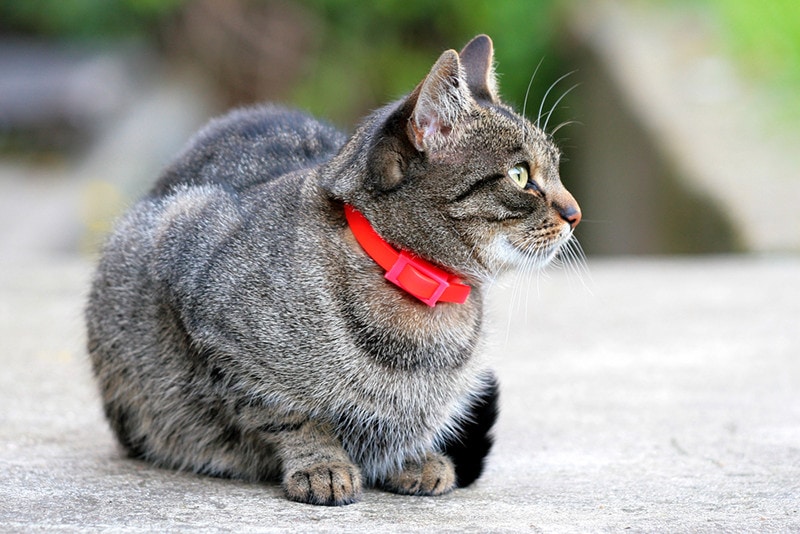
Conclusion
Cats biting their feet can be concerning for pet owners, but understanding the potential causes behind this behavior can help you address the issue effectively. By consulting your veterinarian, maintaining proper grooming practices, and providing a comfortable environment for your cat, you can minimize the likelihood of your feline friend biting their feet. Remember to monitor your cat’s behavior and seek professional advice if you’re concerned about their well-being.
Featured Image Credit: Wannarat G, Shutterstock








